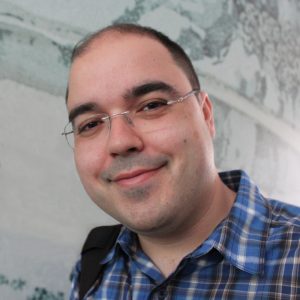Miguel Pardal
Short Personal Interview
Miguel Pardal was born in 1977, in Lisbon, Portugal. He is an INESC-ID Researcher since 2015, integrating the Scientific Area Distributed, Parallel and Secure Systems (DPSS). Miguel Pardal is also member of the Scientific Council of INESC-ID.

How did you get to INESC-ID?
INESC-ID has long been a beacon of quality research in the Técnico community, so when I adjusted my research area to cybersecurity applied to the cloud and the internet of things, it made perfect sense to join the team.
INESC-ID is…
top-quality research, through passionate hard work
Research project(s) under development (please indicate the name of the project(s)
SureThing
How would you explain in the most accessible and least technical language possible, what is the application / expected results of this (these) project (s)?
The SureThing project is developing new ways to quickly and reliably prove our presence at specific locations, both for mobile and for internet of things applications. This will make checking-in at a medical office and getting a absence justification automatic. It can also improve the experience of visiting new locations with systems that can reliably reward users for completing tours.
Tell us about your favorite project so far (or one of them)?
My favorite project so far has been SafeCloud (H2020), where we collaborated with colleagues across Europe to develop added-security solutions. The INESC-ID team contributed to the development of reinforced-security channels that can go beyond TLS (the Security in HTTPS) with route monitoring and multiple layers of encryption.
What are the biggest challenges of working in research in this area?
One of the biggest challenges of working in Cybersecurity is keeping up the new threats that appear every week. On the one hand, we have to develop new and groundbreaking security mechanisms, to improve the security of systems, in the medium and long-term. On the other hand, we have to respond to emergencies, in the short-term.
What book are you currently reading?
The Inversion Factor, by Linda Bernardi, Sanjay Sarma (my PhD co-advisor) and Ken Traub (MIT Press). It discusses how businesses can adapt to the many possibilities of the internet of things. The inversion refers to stop thinking about products and center the design in the novel user experiences made possible by the new technologies.
How would you explain to your child (or your parents or grandparents) what your job is? How do you explain what means to be a researcher in this area?
Unfortunately there are bad people doing bad things on the Internet, and we have to outsmart them and keep everyone safe, while still enjoying the advantages of digital technologies.
How do you see the mission of INESC-ID “ to produce added value to people and society, supporting the response of public policies to scientific, health, environmental, cultural, social, economic and political challenges, in the fields of Computer Science and Electrical and Computer Engineering”?
I see INESC-ID playing a very significant role in society, as we bring the future closer to the present reality, and use our technical expertise to improve the technology and provide guidelines and scientific advice to policy decisions. This role is also critical to the formation of the next generations of engineers and researchers. We need to prepare them today for the challenges the world will face tomorrow.
…
Academic Degree
Doctorate
Training / Research Area(s)
Computer Science and Engineering
INESC-ID Scientific Area
Distributed, Parallel and Secure Systems (DPSS)
miguel.pardal@tecnico.ulisboa.pt
Linkedin Profile Link
https://www.linkedin.com/in/miguelpardal/
Twitter Profile Link
